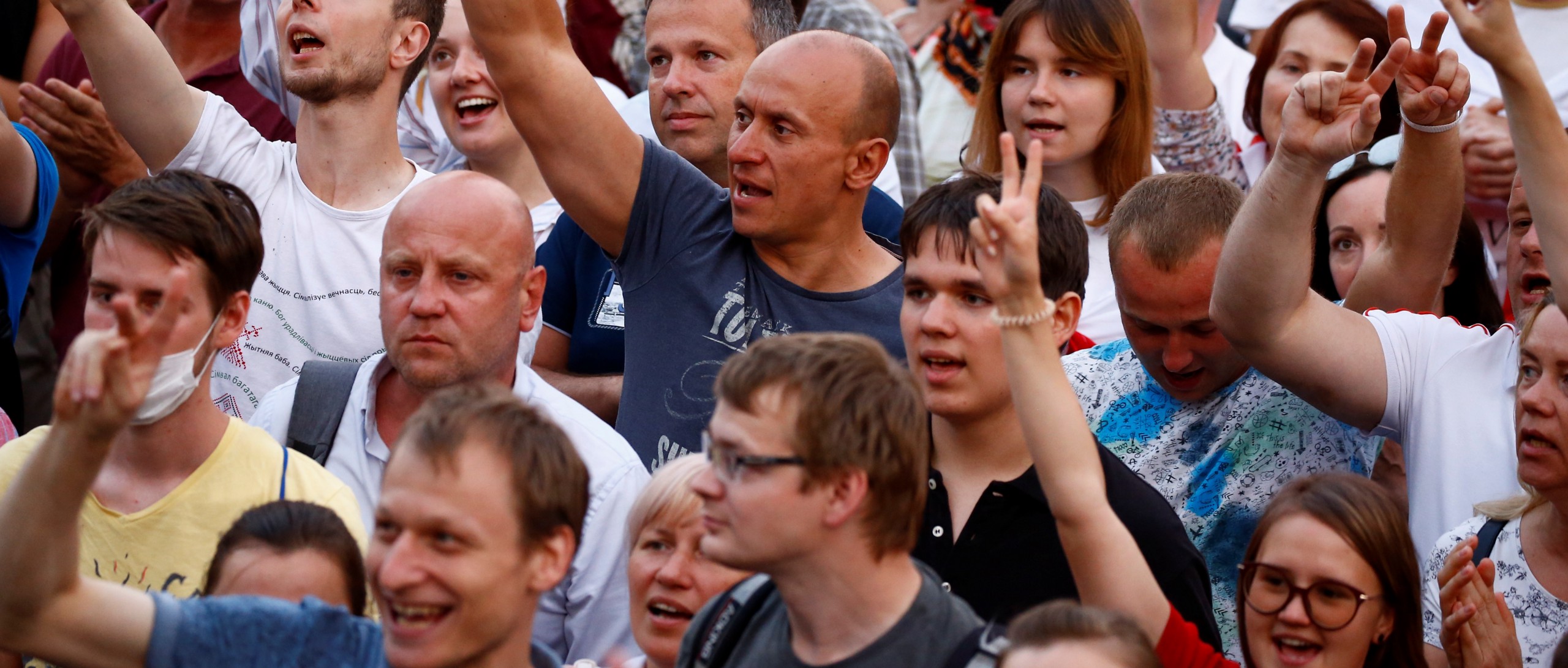
In an attempt to delegitimize grassroots action in Belarus, pro-Kremlin outlets assert that the unrest was orchestrated by outside forces

Amid the ongoing mass protests in Belarus, Russian state-funded and fringe media outlets accused Poland and the three Baltic countries of interfering in Belarusian affairs and instigating the protests.
The DFRLab identified several unsubstantiated claims pushed by Russian state-funded and fringe media. These narratives are in line with statements made by Belarusian and Russian officials. President Lukashenka stated on August 10, 2020 that the post-election protests in Belarus were “led by Poland, Great Britain and the Czech Republic.” Along similar lines, Russian Ministry of Foreign Affairs spokesperson Maria Zakharova argued that the protests were provoked by “third forces whose purpose was to fracture Belarusian society. According to the DFRLab’s analysis, Russian outlets mainly targeted Poland and the Baltic states.
While some expected that the Kremlin would react promptly to large-scale protests in Belarus as it did in the case of Ukraine, many experts have argued that the Kremlin is waiting to see how things develop and is not rushing to interfere. Russian independent media outlet Meduza reported on August 19 that members of Russia’s ruling parties, as well as state-funded propaganda media outlets, have not received clear guidelines from Russian authorities on how to cover the protests in Belarus. The author explained the absence of clear instructions from the Kremlin by noting that the Kremlin is not unanimous on how it would respond to a political crisis in Belarus, and what would constitute a “desirable scenario” for Russia.
Narrative 1: Poland and the Baltic states are fueling protests in Belarus
Narratives against Poland and the Baltic states were put forward mainly by Sputnik, Baltnews, Rubaltic.ru, NewsFront and Vzglyad. Kremlin-owned media outlet Baltnews claimed that, even though the Belarusian Central Election Commission announced that Lukashenka had won the election, the Baltic states and Poland were unequivocally supporting unauthorized rallies and instigating protests in a sovereign country. In the same vein, Rubaltic.ru, a pro-Kremlin outlet, asserted that Poland and the Baltics states are blackmailing and forcing Lukashenka to share power with the opposition. According to Russian propaganda outlets News Front, Polish special services coordinated the current political crisis as part of an operation conducted by Ukraine and the Baltic states. Kremlin-funded outlet Sputnik Belarus, meanwhile, quoted Semyon Uralov, editor-in-chief of the Sonar-2050 scientific center, who claimed that Poland and Lithuania strongly opposed the formation of a union state between Russia and Belarus, and that both countries instigated the political crisis in Belarus.

The ongoing protests in Belarus are a genuine, grassroots political movement on the part of the people of Belarus, triggered by the likely falsification of the presidential election results in favor of the incumbent Alyaksandr Lukashenka. Amid widespread police violence against the protesters, the heads of state of Poland and the three Baltic states adopted a joint declaration asking the Belarusian government to end violence against protesters and initiate a dialogue with the Belarusian people.
Narrative 2: The United States is using Poland and the Baltic states against Belarus
An article in Front News suggested that the protests in Belarus were part of a war against Russia, and that the United States was using Poland in this war. The author of the article also dismissed Belarus as an independent country and argued that it was a part of Russia. Sputnik Latvia alleged that the Baltic states and Poland want to punish Belarus to assert themselves as important players on the international stage. Later on, the author of the Sputnik piece dismissed the chances that the Baltic states and Poland could maintain an independent stance vis-à-vis Western European countries. A separate article by Sputnik Latvia suggested that the West intended to drag Belarus into the “Western camp,” as it did in Ukraine. Baltnews suggested that by refusing to recognize election results, Poland and the Baltic states fulfilled the strategic objectives of the United States, which does not want Lukashenka to stay in power. Baltnews also asserted that criticism of Belarus from the Baltic states was hypocritical and guided by the prospect of economic gain.
The United States, European Union, Council of Europe, and other countries declared elections in Belarus as “neither free nor fair.” However, pro-Kremlin propaganda portrayed this criticism as an incitement of the protests and also continued its traditional line accusing Poland and the Baltic states of being satellites of the United States in Eastern Europe. So far, there has not been any evidence that external forces are meddling in Belarus’s internal affairs or instigating protests.
Narrative 3: Pro-Kremlin media accuses Nexta of having links with Polish intelligence services
Rubaltic.ru suggested the popular Telegram channel Nexta is connected to Polish intelligence services. Since the outbreak of the protests, Nexta has become one of the most reliable sources of information on the ongoing developments in Belarus. The founder of the channel is a Belarusian journalist named Stepan Putilo, against whom the Belarusian government initiated a criminal case for allegedly organizing mass riots. He is also wanted in Russia. Nexta is overtly critical of the Lukashenka regime, and, much like other Belarusian independent outlets, such as Belsat TV and Charter 97, it is operated from Poland because of Belarus’s lack of media freedom. There is no evidence that the channel is linked to Polish intelligence services.
These narratives are all intended to discredit the ongoing protests in Belarus and deligimatize any expressions of solidarity with the protesters made by the international community. Despite the effort, however, the public outrage against Lukashenko and the demands for a free and democratic Belarus show no signs of abating.
Givi Gigitashvili is Research Assistant, Caucasus, with the Digital Forensic Research Lab and is based in Georgia.
Follow along on Twitter for more in-depth analysis from our #DigitalSherlocks.

